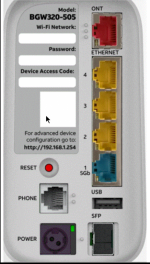One difference to the other thread you referenced is that I purchased a new router as part of my troubleshooting. So it is impossible that any of my old settings were "not being reset/cleared" because this router never had any of them. I started from scratch. I also purchased a new VPN provider and got a new ISP.
The new router is not defective and it works fine with basic settings. My problem is that I cannot get my current configuration to function as intended.
Please remind me, how are you configuring the router/network after doing a full reset?
I have one VPN client (ExpressVPN) with their "stock" upd ovpn file, and I have the built-in kill switch enabled. I'm using the VPN Director feature. This is the area of configuration I cannot get stable. Other than that, there is nothing unusual about my configuration and nothing important I have changed from default*.
* I will add more details in response to your question about scripts.
What settings/features and options are you changing past defaults?
As described above. All default settings are OK for me except I need to have a working VPN client tunnel and kill switch. I will speak about YazFi in the next section.
No, except for YazFi, which I have determined is not related to this issue. The reasons for that determination are stated earlier in this thread. The problematic behavior existed before I installed YazFi and it is unchanged after installing it. I have removed and re-added YazFi, and it does not impact the issue. My other router which had the same problematic behavior never had YazFi installed.
Do you have a USB drive (or other USB devices) plugged into the router?
No.
Recap:
All wired and wireless clients lose access to the internet after a few days. Initially I tried a lot of haphazard things to solve that problem, including adding more VPN clients. I was advised to simplify my configuration, so I removed all that extra stuff I tried as part of my troubleshooting. I now have a clean and simple configuration with one VPN client and no scripts except for YazFi, as stated above.
What this thread helped me discover is that when the clients lose internet connectivity, the WAN interface and the VPN tunnel are still up!
The clients are connected to the router and the router is connected to the Internet. Between those two points, traffic is blocked. That's the issue.
I can work around the issue with a reboot without changing any settings, and things will work as expected for several days. I also learned in this thread that any action I take to "apply settings" by the router's GUI, even if those settings changes are trivial and don't really change anything, will resolve the problem without a reboot or even without a change in the VPN connection (because that connection never appears to go down, based on testing done earlier in this thread).



